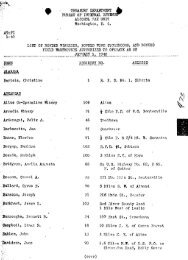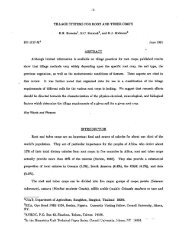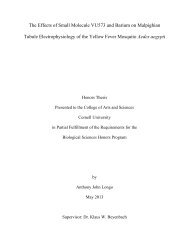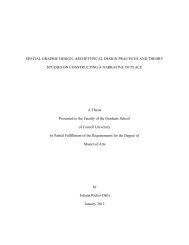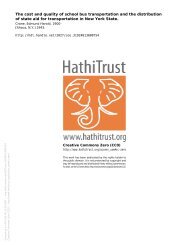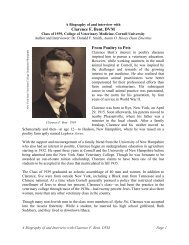1/1 - eCommons@Cornell - Cornell University
1/1 - eCommons@Cornell - Cornell University
1/1 - eCommons@Cornell - Cornell University
- No tags were found...
Create successful ePaper yourself
Turn your PDF publications into a flip-book with our unique Google optimized e-Paper software.
the basic building block of life, the<br />
DNA molecule. Biotechnology has<br />
created pigs that bleed human hemoglobin,<br />
bacteria that secrete cow hormones<br />
and roses with a natural blue<br />
tint. In the future, it could put summertime-fresh,<br />
vine-ripened tomatoes<br />
on supermarket shelves in February,<br />
make bacon with the fat content<br />
of chicken and cook up low-calorie<br />
french fries.<br />
Proponents call bioengineered<br />
foods the most important agricultural<br />
advance since the Green Revolution<br />
of the 1950s and '60s.<br />
Opponents call them Frankenfoods.<br />
<strong>Cornell</strong>, where some 400 faculty<br />
members work on bioengineering<br />
projects, is in the eye of the tempest<br />
because the possibility for practical<br />
use of the most widely-known (some<br />
would say notorious) recombinant<br />
product, bovine somatropin (bST),<br />
was first developed by animal science<br />
Prof. Dale E. Bauman. And it was<br />
horticulture Prof. John Sanford and<br />
engineering Professor Emeritus<br />
Edward Wolf who developed the<br />
"gene gun," a device that introduces<br />
foreign DNA into cells.<br />
But as in any debate, you can find<br />
<strong>Cornell</strong>ians on all sides of the<br />
bioengineered foods issue. The chief<br />
spokesman for the Washington, DCbased<br />
Union of Concerned Scientists<br />
(UCS) is Jane Rissler, PhD 77. The<br />
<strong>Cornell</strong>-affiliated Boyce Thompson<br />
Institute is home base for the National<br />
Agricultural Biotechnology<br />
Council, which tries to keep open the<br />
avenues of communication between<br />
those who support the science and<br />
those who fear it.<br />
The debate has even found its<br />
way into the classrooms of the Ag<br />
college, where most of the <strong>Cornell</strong>based<br />
bioengineering research is<br />
conducted. "A lot of students don't<br />
like it," says plant pathology Prof.<br />
Milton Zaitlin, associate director of<br />
the university's biotechnology program.<br />
"I tell them what my point of<br />
view is, and they still don't like it."<br />
Scientists believe that the fear of<br />
genetic engineering is simply a misunderstanding.<br />
Today's biotechnology,<br />
they say, is no more than a hightech<br />
spin on the ancient techniques<br />
of selective breeding, the process<br />
which brought us everything from<br />
sweet corn to Secretariat.<br />
"The beauty of the molecular<br />
route is that it allows you to move<br />
genes from any one organism to<br />
another, it allows you to move them<br />
in a very purified way," says Ralph<br />
W. F. Hardy, president and CEO of<br />
the 70-year-old Boyce Thompson<br />
Institute for Plant Research (BTI).<br />
"You're making a miniscule change<br />
in the kind of genetic material in the<br />
recipient organism, but you're giving<br />
it some capability—better nutrition,<br />
a longer shelf life, more tolerance<br />
to cold, better color, better flavor—than<br />
it had before. To me it<br />
doesn't matter if that gene came from<br />
a water buffalo, a fish or a bacteria."<br />
But it does matter to others.<br />
"I don't see that the<br />
technology will bring the<br />
benefits that many proponents<br />
think it will," says UCS's Jane<br />
Rissler. "To me the Flavr Savr tomato<br />
[a tomato genetically engineered<br />
to have a long shelf life] or a<br />
potato that has more solids in it so it<br />
takes up less oil when you fry it are<br />
not things that strike me as critical<br />
in the food supply. I would eat fewer<br />
french fries if I wanted to get less fat."<br />
Central to the debate is one biotechnology<br />
product in particular: a<br />
191 amino-acid protein hormone<br />
called bovine somatotropin (bST),<br />
also known as bovine growth hormone<br />
(BGH). The hormone, which<br />
occurs naturally in cows, helps the<br />
animals convert feed into milk.<br />
Supplemental injections of bST are<br />
designed to boost milk production.<br />
The product is marketed by its manufacturer,<br />
the chemical giant Monsanto,<br />
under the brand name Posilac,<br />
and was approved for general use by<br />
the U.S. Food and Drug Administra-<br />
CORNELL MAGAZINE<br />
24<br />
tion in November 1993, after more<br />
than 13 years of painstaking testing<br />
and investigation. Although Monsanto<br />
won't discuss how much it<br />
spent developing bST, chemical industry<br />
estimates of $300 million are<br />
common.<br />
Monsanto says that Posilac can<br />
increase milk production in a wellmanaged<br />
herd of dairy cows by 15<br />
percent per cow (some put the figure<br />
as high as 25 percent). Monsanto<br />
says bST is safe for humans, will be<br />
a boon to farmers and will improve<br />
the environment because dairies will<br />
be able to produce more milk with<br />
fewer cows, which in turn will produce<br />
less waste (an average dairy<br />
cow produces about 100 pounds of<br />
solid and liquid waste per day).<br />
Monsanto says that with bST, farmers<br />
can increase a cow's daily milk<br />
production by about nine pounds,<br />
giving the farmer an additional annual<br />
$8,000 profit for a 75-animal<br />
herd. The FDA estimates that 10 to<br />
15 percent of U.S. dairy farmers will<br />
be using bST by year's end.<br />
The hormone has been publicly<br />
endorsed by the American Medical<br />
Association, the National Institutes<br />
of Health and former Surgeon General<br />
of the United States C. Everett<br />
Koop, MD '41. Although the recombinant<br />
protein differs from the natural<br />
one by a single amino acid, authorities<br />
say that this does not affect<br />
the milk. They have declared milk<br />
from bST-treated cows to be identical<br />
to milk from untreated cows, and<br />
safe for human consumption.<br />
But despite official assurances,<br />
some consumers say they believe the<br />
product is healthy for neither cows<br />
nor people nor the environment nor<br />
the family farm. After all, scientists<br />
and the government told them silicone<br />
breast implants, DDT, DES and<br />
thalidomide were safe, too. The mass<br />
media has reflected the public fears<br />
about bioengineered foods with everything<br />
from segments on ABC's<br />
"20/20" to killer tomato cartoons in<br />
the New York Post<br />
Many in the scientific community



